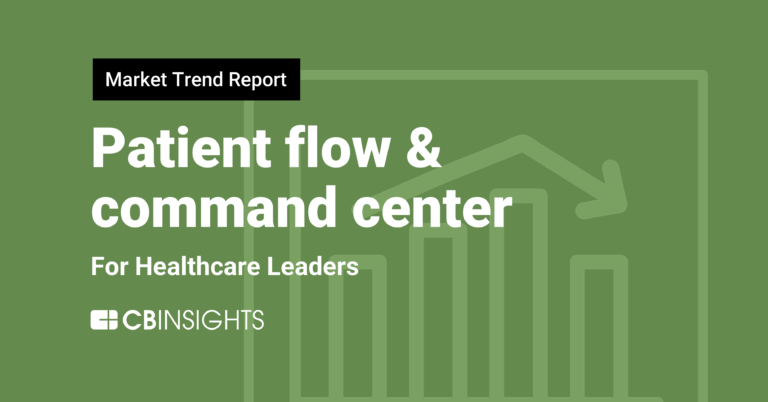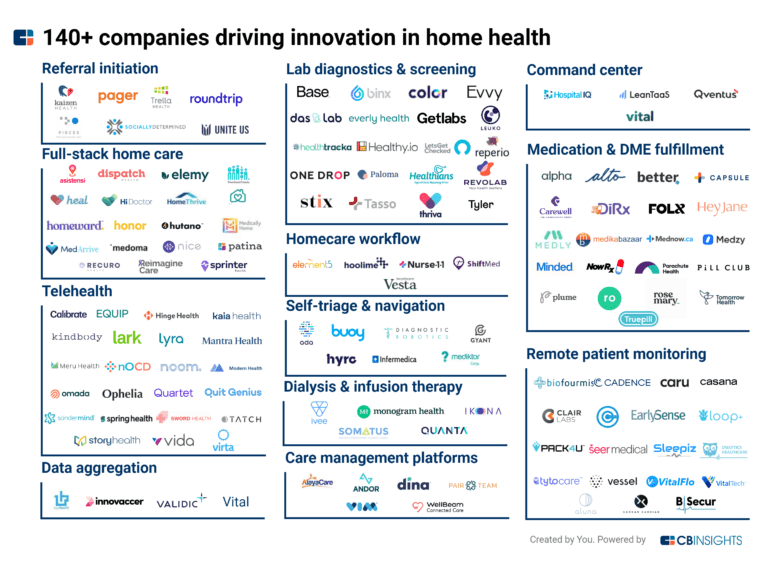
Qventus
Founded Year
2012Stage
Series D | AliveTotal Raised
$201.84MValuation
$0000Last Raised
$85M | 3 mos agoMosaic Score The Mosaic Score is an algorithm that measures the overall financial health and market potential of private companies.
+170 points in the past 30 days
About Qventus
Qventus focuses on healthcare operations automation in the healthcare industry. The company provides solutions that optimize operational processes, including operating room utilization and discharge planning, to improve efficiency and patient care. Qventus serves healthcare systems and hospitals, working to improve operational processes and patient flow in inpatient and perioperative settings. It was founded in 2012 and is based in Mountain View, California.
Loading...
Qventus's Product Videos
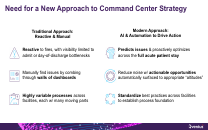
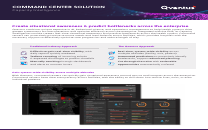
ESPs containing Qventus
The ESP matrix leverages data and analyst insight to identify and rank leading companies in a given technology landscape.
The surgical scheduling software market is a rapidly growing market that is attracting the attention of healthcare providers and stakeholders alike. Surgical scheduling software solutions allow hospitals and surgical centers to streamline and optimize their surgical scheduling processes, resulting in more efficient and cost-effective patient care. These solutions can automate tasks such as patient…
Qventus named as Highflier among 7 other companies, including Caresyntax, LeanTaaS, and Surgimate.
Qventus's Products & Differentiators
Perioperative Solution
The Perioperative Solution, leveraged by Banner Health and other leading health systems, enhances surgical efficiencies by maximizing operating room access, increasing strategic case growth, and providing actionable, real-time insights. The solution increases case volume by 3-6 cases per OR per month, yielding an average 6X return on investment (up to 27X).
Loading...
Research containing Qventus
Get data-driven expert analysis from the CB Insights Intelligence Unit.
CB Insights Intelligence Analysts have mentioned Qventus in 3 CB Insights research briefs, most recently on Sep 22, 2023.
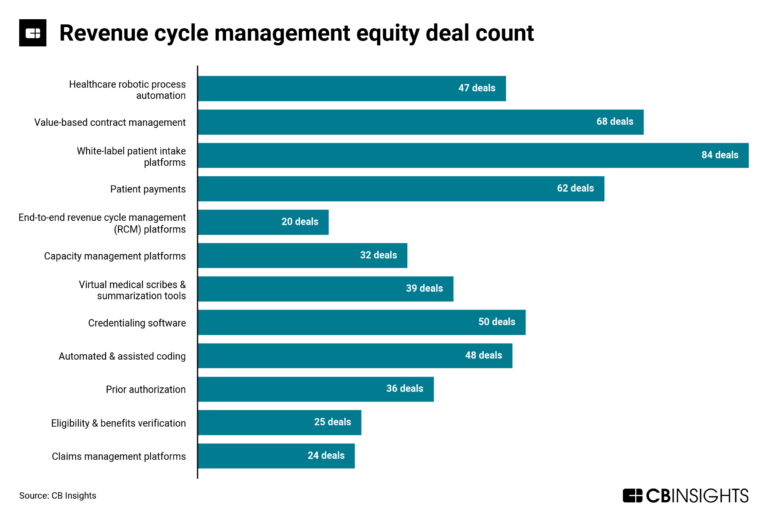
Sep 22, 2023
The revenue cycle management market mapExpert Collections containing Qventus
Expert Collections are analyst-curated lists that highlight the companies you need to know in the most important technology spaces.
Qventus is included in 5 Expert Collections, including Conference Exhibitors.
Conference Exhibitors
5,501 items
HLTH is a healthcare event bringing together startups and large companies from pharma, health insurance, business intelligence, and more to discuss the shifting landscape of healthcare
AI 100
100 items
Digital Health
11,305 items
The digital health collection includes vendors developing software, platforms, sensor & robotic hardware, health data infrastructure, and tech-enabled services in healthcare. The list excludes pureplay pharma/biopharma, sequencing instruments, gene editing, and assistive tech.
Digital Health 50
150 items
2022's cohort of the most promising digital health startups transforming the healthcare industry. Winners were chosen based on several factors, including data submitted by the companies, proprietary Mosaic scores, company business models and momentum in the market.
Artificial Intelligence
7,221 items
Latest Qventus News
Mar 18, 2025
Hospital administrators see AI filling a vital role: not taking over care, but helping nurses and doctors gather information and communicate with patients. Share this: By MATTHEW PERRONE The next time you’re due for a medical exam you may get a call from someone like Ana: a friendly voice that can help you prepare for your appointment and answer any pressing questions you might have. Related Articles With her calm, warm demeanor, Ana has been trained to put patients at ease — like many nurses across the U.S. But unlike them, she is also available to chat 24-7, in multiple languages, from Hindi to Haitian Creole. That’s because Ana isn’t human , but an artificial intelligence program created by Hippocratic AI, one of a number of new companies offering ways to automate time-consuming tasks usually performed by nurses and medical assistants. It’s the most visible sign of AI’s inroads into health care , where hundreds of hospitals are using increasingly sophisticated computer programs to monitor patients’ vital signs, flag emergency situations and trigger step-by-step action plans for care — jobs that were all previously handled by nurses and other health professionals. Hospitals say AI is helping their nurses work more efficiently while addressing burnout and understaffing. But nursing unions argue that this poorly understood technology is overriding nurses’ expertise and degrading the quality of care patients receive. “Hospitals have been waiting for the moment when they have something that appears to have enough legitimacy to replace nurses,” said Michelle Mahon of National Nurses United. “The entire ecosystem is designed to automate, de-skill and ultimately replace caregivers.” Mahon’s group, the largest nursing union in the U.S., has helped organize more than 20 demonstrations at hospitals across the country, pushing for the right to have say in how AI can be used — and protection from discipline if nurses decide to disregard automated advice. The group raised new alarms in January when Robert F. Kennedy Jr. , the incoming health secretary, suggested AI nurses “as good as any doctor” could help deliver care in rural areas. On Friday, Dr. Mehmet Oz , who’s been nominated to oversee Medicare and Medicaid, said he believes AI can “liberate doctors and nurses from all the paperwork.” Hippocratic AI initially promoted a rate of $9 an hour for its AI assistants, compared with about $40 an hour for a registered nurse. It has since dropped that language, instead touting its services and seeking to assure customers that they have been carefully tested. The company did not grant requests for an interview. AI in the hospital can generate false alarms and dangerous advice Hospitals have been experimenting for years with technology designed to improve care and streamline costs, including sensors, microphones and motion-sensing cameras. Now that data is being linked with electronic medical records and analyzed in an effort to predict medical problems and direct nurses’ care — sometimes before they’ve evaluated the patient themselves. In this photo provided by National Nurses United, nurses hold a rally in San Francisco on April 22, 2024, to highlight safety concerns about using artificial intelligence in health care. (National Nurses United via AP) Adam Hart was working in the emergency room at Dignity Health in Henderson, Nevada, when the hospital’s computer system flagged a newly arrived patient for sepsis, a life-threatening reaction to infection. Under the hospital’s protocol, he was supposed to immediately administer a large dose of IV fluids. But after further examination, Hart determined that he was treating a dialysis patient, or someone with kidney failure. Such patients have to be carefully managed to avoid overloading their kidneys with fluid. Hart raised his concern with the supervising nurse but was told to just follow the standard protocol. Only after a nearby physician intervened did the patient instead begin to receive a slow infusion of IV fluids. “You need to keep your thinking cap on— that’s why you’re being paid as a nurse,” Hart said. “Turning over our thought processes to these devices is reckless and dangerous.” Hart and other nurses say they understand the goal of AI: to make it easier for nurses to monitor multiple patients and quickly respond to problems. But the reality is often a barrage of false alarms, sometimes erroneously flagging basic bodily functions — such as a patient having a bowel movement — as an emergency. “You’re trying to focus on your work but then you’re getting all these distracting alerts that may or may not mean something,” said Melissa Beebe, a cancer nurse at UC Davis Medical Center in Sacramento. “It’s hard to even tell when it’s accurate and when it’s not because there are so many false alarms.” Can AI help in the hospital? Even the most sophisticated technology will miss signs that nurses routinely pick up on, such as facial expressions and odors, notes Michelle Collins, dean of Loyola University’s College of Nursing. But people aren’t perfect either. “It would be foolish to turn our back on this completely,” Collins said. “We should embrace what it can do to augment our care, but we should also be careful it doesn’t replace the human element.” More than 100,000 nurses left the workforce during the COVID-19 pandemic, according to one estimate, the biggest staffing drop in 40 years. As the U.S. population ages and nurses retire, the U.S. government estimates there will be more than 190,000 new openings for nurses every year through 2032. Faced with this trend, hospital administrators see AI filling a vital role: not taking over care, but helping nurses and doctors gather information and communicate with patients. ‘Sometimes they are talking to a human and sometimes they’re not’ At the University of Arkansas Medical Sciences in Little Rock, staffers need to make hundreds of calls every week to prepare patients for surgery. Nurses confirm information about prescriptions, heart conditions and other issues — like sleep apnea — that must be carefully reviewed before anesthesia. The problem: many patients only answer their phones in the evening, usually between dinner and their children’s bedtime. “So what we need to do is find a way to call several hundred people in a 120-minute window — but I really don’t want to pay my staff overtime to do so,” said Dr. Joseph Sanford, who oversees the center’s health IT. This March 2025 image from the website of artificial intelligence company Xoltar, shows two of of their demonstration avatars for conducting video calls with patients. (Xoltar via AP) Since January, the hospital has used an AI assistant from Qventus to contact patients and health providers, send and receive medical records and summarize their contents for human staffers. Qventus says 115 hospitals are using its technology, which aims to boost hospital earnings through quicker surgical turnarounds, fewer cancellations and reduced burnout. Each call begins with the program identifying itself as an AI assistant. “We always want to be fully transparent with our patients that sometimes they are talking to a human and sometimes they’re not,” Sanford said. While companies like Qventus are providing an administrative service, other AI developers see a bigger role for their technology. Israeli startup Xoltar specializes in humanlike avatars that conduct video calls with patients. The company is working with the Mayo Clinic on an AI assistant that teaches patients cognitive techniques for managing chronic pain. The company is also developing an avatar to help smokers quit. In early testing, patients spend about 14 minutes talking to the program, which can pickup on facial expressions, body language and other cues, according to Xoltar. Nursing experts who study AI say such programs may work for people who are relatively healthy and proactive about their care. But that’s not most people in the health system. “It’s the very sick who are taking up the bulk of health care in the U.S. and whether or not chatbots are positioned for those folks is something we really have to consider,” said Roschelle Fritz of the University of California Davis School of Nursing. The Associated Press Health and Science Department receives support from the Howard Hughes Medical Institute’s Science and Educational Media Group and the Robert Wood Johnson Foundation. The AP is solely responsible for all content. Originally Published:
Qventus Frequently Asked Questions (FAQ)
When was Qventus founded?
Qventus was founded in 2012.
Where is Qventus's headquarters?
Qventus's headquarters is located at 295 Bernardo Avenue, Mountain View.
What is Qventus's latest funding round?
Qventus's latest funding round is Series D.
How much did Qventus raise?
Qventus raised a total of $201.84M.
Who are the investors of Qventus?
Investors of Qventus include Bessemer Venture Partners, Northwestern Medicine, HonorHealth, KKR, Allina Health System and 12 more.
Who are Qventus's competitors?
Competitors of Qventus include Protenus, Pieces, Plenful, Kinometrix, Hospital IQ and 7 more.
What products does Qventus offer?
Qventus's products include Perioperative Solution and 2 more.
Who are Qventus's customers?
Customers of Qventus include OhioHealth and https://www.honorhealth.com/.
Loading...
Compare Qventus to Competitors

LeanTaaS focuses on digital transformation for the healthcare sector, optimizing hospital and infusion center operations. The company's offerings include predictive and prescriptive analytics, machine learning, and generative AI solutions aimed at improving healthcare capacity and patient access, as well as minimizing wait times. LeanTaaS serves hospitals and ambulatory service providers, with a goal of improving operational processes and lowering healthcare delivery expenses. It was founded in 2010 and is based in Santa Clara, California.

LiveData is a company focused on providing real-time operational intelligence and perioperative workflow solutions within the healthcare sector. The company offers a suite of products designed to optimize surgical scheduling, enhance patient safety, and improve operational efficiency by integrating with electronic health records. LiveData primarily serves the healthcare industry, with solutions tailored to hospitals, health systems, and surgical centers. It was founded in 1991 and is based in Cambridge, Massachusetts.

MYSPHERA focuses on aiding patient flow in healthcare organizations by utilizing technology. The company offers solutions for complex processes within operating rooms, emergency departments, and other healthcare settings to aid patient care. MYSPHERA primarily serves the healthcare industry, providing location systems (RTLS) for operational workflows and patient management. It was founded in 2012 and is based in Paterna, Spain.

Copient Health is a healthcare technology company focused on improving operating room (OR) scheduling efficiency within the healthcare sector. The company offers solutions that utilize machine learning to identify and reclaim unused OR time, distribute collected time slots to physicians, and provide analytics for better management and decision-making. Copient Health primarily serves hospitals and surgery centers seeking to enhance their OR utilization and scheduling processes. It was founded in 2019 and is based in Atlanta, Georgia.

Tagnos offers software solutions for workflows in operating rooms, emergency departments, and asset management, providing insights and data to improve patient care and operational efficiency. The company primarily serves the healthcare sector. It was founded in 2010 and is based in Irvine, California.

Plenful specializes in workflow automation for the pharmacy and healthcare sectors. The company offers a platform that automates administrative tasks and maximizes operational productivity and revenue capture for healthcare organizations. Plenful's solutions cater to a range of healthcare providers, including health systems, pharmacies, and provider groups. It was founded in 2021 and is based in San Francisco, California.
Loading...

